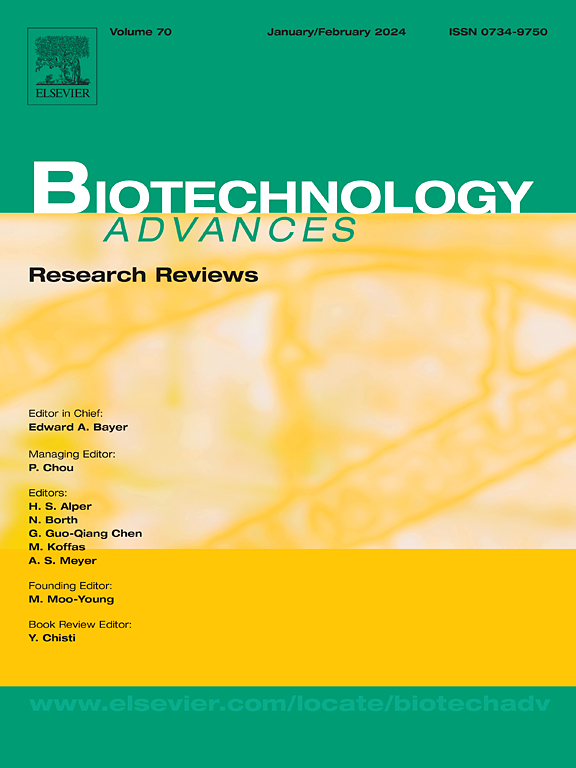植物次生代谢物抗生物胁迫的可持续作物保护研究
IF 12.1
1区 工程技术
Q1 BIOTECHNOLOGY & APPLIED MICROBIOLOGY
引用次数: 0
摘要
可持续农业实践对于实现无饥饿世界是不可或缺的,特别是在全球人口持续增长的情况下。生物压力,如病原体、昆虫和害虫,严重威胁着全球粮食安全和作物生产力。传统的化学农药虽然有效,但随着时间的推移会导致环境退化,并增强害虫的抵抗力。植物衍生的天然产物,如次生代谢物,如生物碱、萜类、酚类和植物抗毒素,由于它们能够增强植物免疫力和抑制害虫活性,提供了很有希望的替代品。分子生物学和生物技术的最新进展提高了我们对这些天然化合物如何在细胞水平上发挥作用的理解,通过各种转录因子(如MYB, WRKY, bHLH, bZIP, NAC和AP2/ERF)调节的复杂生化途径激活特定的植物防御。多组学方法的进步,包括基因组学、转录组学、蛋白质组学和代谢组学,极大地提高了对控制PSM合成的调控网络的理解。这些整合的方法已经导致了对植物对生物胁迫反应的新见解的发现,确定了植物防御的关键调控基因和途径。CRISPR/ cas9介导的基因编辑等先进技术可以精确操纵PSM途径,进一步增强植物的抗性。了解psm、TFs和生物胁迫反应之间的复杂相互作用,不仅可以推进植物生物学的发展,而且可以为开发具有更好抗病虫害能力的作物提供可行的策略,有助于可持续农业和粮食安全。本文综述了psm的重要作用、它们的生物合成途径、TFs的调控作用以及它们在增强植物防御和可持续性方面的潜在应用。它还强调了多组学方法在发现基因功能和与次生代谢物生物合成相关的基因代谢工程方面的惊人潜力。综上所述,本综述为利用植物次生代谢物增强作物生物抗逆性的研究提供了新的思路。本文章由计算机程序翻译,如有差异,请以英文原文为准。
Plant secondary metabolites against biotic stresses for sustainable crop protection
Sustainable agriculture practices are indispensable for achieving a hunger-free world, especially as the global population continues to expand. Biotic stresses, such as pathogens, insects, and pests, severely threaten global food security and crop productivity. Traditional chemical pesticides, while effective, can lead to environmental degradation and increase pest resistance over time. Plant-derived natural products such as secondary metabolites like alkaloids, terpenoids, phenolics, and phytoalexins offer promising alternatives due to their ability to enhance plant immunity and inhibit pest activity. Recent advances in molecular biology and biotechnology have improved our understanding of how these natural compounds function at the cellular level, activating specific plant defense through complex biochemical pathways regulated by various transcription factors (TFs) such as MYB, WRKY, bHLH, bZIP, NAC, and AP2/ERF. Advancements in multi-omics approaches, including genomics, transcriptomics, proteomics, and metabolomics, have significantly improved the understanding of the regulatory networks that govern PSM synthesis. These integrative approaches have led to the discovery of novel insights into plant responses to biotic stresses, identifying key regulatory genes and pathways involved in plant defense. Advanced technologies like CRISPR/Cas9-mediated gene editing allow precise manipulation of PSM pathways, further enhancing plant resistance. Understanding the complex interaction between PSMs, TFs, and biotic stress responses not only advances our knowledge of plant biology but also provides feasible strategies for developing crops with improved resistance to pests and diseases, contributing to sustainable agriculture and food security. This review emphasizes the crucial role of PSMs, their biosynthetic pathways, the regulatory influence of TFs, and their potential applications in enhancing plant defense and sustainability. It also highlights the astounding potential of multi-omics approaches to discover gene functions and the metabolic engineering of genes associated with secondary metabolite biosynthesis. Taken together, this review provides new insights into research opportunities for enhancing biotic stress tolerance in crops through utilizing plant secondary metabolites.
求助全文
通过发布文献求助,成功后即可免费获取论文全文。
去求助
来源期刊

Biotechnology advances
工程技术-生物工程与应用微生物
CiteScore
25.50
自引率
2.50%
发文量
167
审稿时长
37 days
期刊介绍:
Biotechnology Advances is a comprehensive review journal that covers all aspects of the multidisciplinary field of biotechnology. The journal focuses on biotechnology principles and their applications in various industries, agriculture, medicine, environmental concerns, and regulatory issues. It publishes authoritative articles that highlight current developments and future trends in the field of biotechnology. The journal invites submissions of manuscripts that are relevant and appropriate. It targets a wide audience, including scientists, engineers, students, instructors, researchers, practitioners, managers, governments, and other stakeholders in the field. Additionally, special issues are published based on selected presentations from recent relevant conferences in collaboration with the organizations hosting those conferences.
 求助内容:
求助内容: 应助结果提醒方式:
应助结果提醒方式:


